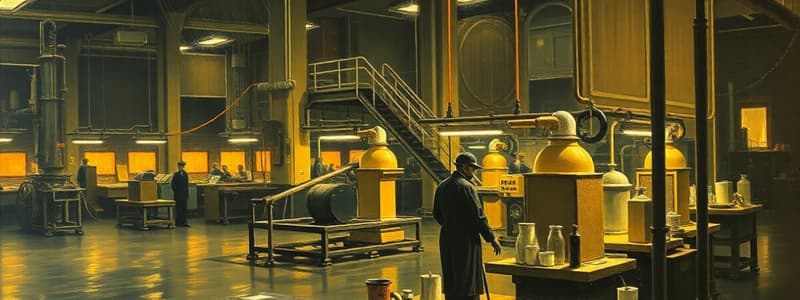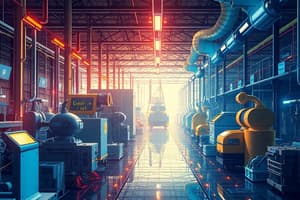Podcast
Questions and Answers
What primary focus does the Mechatronics section cover?
What primary focus does the Mechatronics section cover?
- Digital sensors and actuators, and PLC and HMI systems (correct)
- Electrical safety regulations
- Programming electrical circuits
- Understanding mechanical systems only
What is the role of system integrators and machine builders in industrial automation?
What is the role of system integrators and machine builders in industrial automation?
- Design, build, and install automation systems (correct)
- Only use automation systems in production
- Focus solely on electrical safety
- Conduct troubleshooting on existing systems
Which of the following is covered in the Electrical Engineering section?
Which of the following is covered in the Electrical Engineering section?
- Calculation of electrical quantities in DC and AC circuits (correct)
- Robot programming techniques
- HMI system configuration
- Mechatronic design principles
What skill is emphasized in the Control System Programming section?
What skill is emphasized in the Control System Programming section?
Which fundamental concepts are covered in the Electrical Engineering section?
Which fundamental concepts are covered in the Electrical Engineering section?
What do end-users do in the context of industrial automation?
What do end-users do in the context of industrial automation?
What type of skills will students gain regarding electrical troubleshooting?
What type of skills will students gain regarding electrical troubleshooting?
Which component is NOT included in the Mechatronics section curriculum?
Which component is NOT included in the Mechatronics section curriculum?
Flashcards are hidden until you start studying
Study Notes
Industrial Automation Overview
- Industrial automation is essential for modern manufacturing and enhances efficiency, safety, and productivity across industries.
- Key components include various systems and technologies that streamline production processes.
Course Curriculum
Electrical Engineering
- Covers fundamental concepts: Direct current (DC), single-phase and three-phase alternating current (AC).
- Focus on calculating electrical quantities in DC and AC circuits.
- Emphasizes electrical measurement techniques and systematic troubleshooting methods.
Mechatronics
- Explores mechatronic systems, including digital sensors and actuators.
- Introduction to Programmable Logic Controllers (PLC) and Human-Machine Interface (HMI) systems.
- Students learn about logical functions and their relevance to mechatronic systems.
Control System Programming
- Focus on programming, troubleshooting of control systems using computer-aided development tools.
- Training includes documenting control systems and exploring basic HMI functionalities.
Skills and Knowledge Development
- Electrotechnical Fundamentals: In-depth learning of electrical safety regulations for working with electrical equipment.
- Sensor and Control Systems: Understanding different types of sensors, their functions, and applications.
- Electrical Troubleshooting: Proficient use of multimeters for voltage and resistance measurements.
- Integration Skills: Knowledge gained in connecting sensors and actuators to control systems, programming PLCs, and configuring HMI devices like touch panels.
Potential Careers and Roles
- End Users: Companies utilizing automation and robotics in their production processes, such as automobile manufacturers.
- System Integrators and Machine Builders: Firms designing, building, and installing industrial automation systems.
Studying That Suits You
Use AI to generate personalized quizzes and flashcards to suit your learning preferences.




